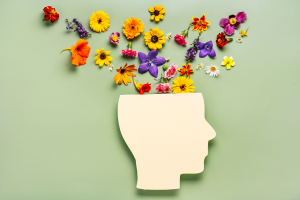Mental Health
 Mental health is a vital aspect of our overall well-being, encompassing emotional, psychological, and social wellness. It affects how we think, feel, and behave, influencing our ability to handle stress, relate to others, and make decisions.
Mental health is a vital aspect of our overall well-being, encompassing emotional, psychological, and social wellness. It affects how we think, feel, and behave, influencing our ability to handle stress, relate to others, and make decisions.
Mental health refers to a state of well-being in which an individual can cope with the normal stresses of life, work productively, and contribute to their community. It involves emotional resilience, self-esteem, and the ability to form and maintain meaningful relationships. Mental health is a dynamic and fluid concept that varies across individuals and over time.
Causes of Mental Health Challenges
- Biological Factors: Genetic predispositions, imbalances in brain chemistry, or changes in neurological structure can contribute to mental health challenges.
- Environmental Factors: Exposure to trauma, abuse, significant life stressors, or chronic environmental stress can impact mental well-being.
- Psychological Factors: Personal experiences, coping mechanisms, and individual perceptions can influence mental health. Psychological factors that influence mental health include beliefs (worldview), attitudes, motivations, emotional attachments, and coping responses to life stressors.[1]
- Social and Cultural Factors: Societal expectations, cultural norms, and social support systems play a role in mental health. Different cultures have their own explanations for mental disorders, such as divine anger, evil spirits, stress, and biogenetic factors. Sociocultural factors can also impact the prevalence of psychopathology and access to psychiatric treatment.
- Health Conditions: Chronic medical conditions, neurological disorders, or substance abuse can affect mental health.
How to Avoid Mental Health Challenges?
- Build Resilience: Develop coping skills and resilience to navigate life’s challenges effectively.
- Social Connection: Foster healthy relationships with friends and family to provide emotional support and connection.
- Seek Professional Help: Early intervention through counseling, therapy, or support groups can be crucial in preventing the escalation of mental health challenges.
- Healthy Lifestyle Choices: Regular exercise, a balanced diet, adequate sleep, and stress management contribute to overall mental well-being.
Relieving Mental Health Challenges
- Therapy and Counseling: Various therapeutic approaches, such as cognitive-behavioral therapy (CBT) or psychotherapy, provide effective tools for managing and overcoming mental health challenges. . The common goals include encouraging change and enhancing the quality of life. Hence, many people seek psychotherapy when they encounter problems that are difficult to face alone or behaviors they want to change.
- Medication: In some cases, medications prescribed by mental health professionals can help regulate brain chemistry and alleviate symptoms.
- Mindfulness and Relaxation Techniques: Practices like meditation, mindfulness, acupuncture, and yoga can enhance mental well-being by reducing stress and promoting a sense of calm. TCM emphasizes that excessive emotions cause disease, and regulating emotions can cure disease. The research found that conventional treatment combined with 4–12 weeks of mindfulness treatment can significantly improve the anxiety and depression symptoms of patients with insomnia. TCM mind-body exercise therapies, such as Tai Chi and Baduanjin, also positively affect anxiety and depression.[2]
How Acupuncture Helps Mental Health?
 Acupuncture, a traditional Chinese medicine practice, involves the insertion of thin needles into specific points on the body to stimulate energy flow. In the realm of mental health, acupuncture has shown promise in:
Acupuncture, a traditional Chinese medicine practice, involves the insertion of thin needles into specific points on the body to stimulate energy flow. In the realm of mental health, acupuncture has shown promise in:
- Anxiety Alleviation: Acupuncture has been found effective in reducing symptoms of anxiety. By targeting specific points known to calm the nervous system, it can decrease anxiety levels, providing a natural alternative to medication for some individuals.[3]
- Depression Relief: Studies suggest that acupuncture can help alleviate symptoms of depression by affecting the parts of the brain known to regulate emotions and stress responses. It offers a complementary treatment option that can work alongside traditional therapies.[4]
- Improvement in Sleep Quality: Many mental health issues are closely linked with sleep disorders such as insomnia. Acupuncture can enhance the quality of sleep by influencing the body’s natural sleep-wake cycles, thereby supporting the healing process for various mental health conditions.[5]
- Enhancement of Cognitive Function: Acupuncture may improve cognitive function, including attention, focus, and memory, which are often compromised in individuals experiencing chronic stress, depression, or anxiety. This cognitive improvement can contribute to better-coping strategies and overall mental health.[6]
- Reduction in PTSD Symptoms: For individuals suffering from Post-Traumatic Stress Disorder (PTSD), acupuncture has shown potential in reducing symptoms. By promoting relaxation and reducing anxiety, it can be a valuable component of a comprehensive PTSD treatment plan.[7]
- Alleviation of Addiction and Withdrawal Symptoms: Acupuncture has been utilized in addiction recovery programs to help alleviate withdrawal symptoms and reduce cravings. It supports the body’s balance during the recovery process, offering a non-pharmacological tool for managing addiction-related challenges.[8]
- Emotional Balance: Through the regulation of the body’s energy or “qi,” acupuncture can promote emotional balance. This holistic approach helps individuals manage emotional highs and lows more effectively, contributing to a more stable mental state.
- Supporting Hormonal Balance: Acupuncture can influence the endocrine system, which plays a significant role in mood regulation and stress responses. By promoting hormonal balance, acupuncture can have a positive impact on mental health, particularly for conditions influenced by hormonal changes, such as postpartum depression.[9]
Choose Happipuncture as Your Trusted Clinic
At Happipuncture, we understand the profound impact mental health has on your overall well-being. Our specialized treatments are designed to offer a sanctuary for your mind, body, and spirit. By addressing stress, anxiety, depression, and other mental health challenges, we aim to restore balance and harmony within.
Take the first step towards a healthier, more balanced you by contacting Happipuncture today. Let us support you in navigating your path to mental wellness. Contact our team at Happipincture or call 09-2182992.



